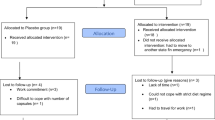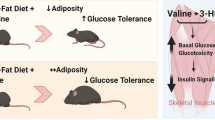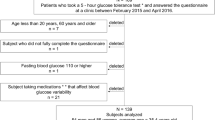Abstract
IT has been reported previously1,2 that certain individuals show a profound lowering of the blood glucose-level following ingestion of leucine or iso-valeric acid and that this is a familial trait.
This is a preview of subscription content, access via your institution
Access options
Subscribe to this journal
Receive 51 print issues and online access
$199.00 per year
only $3.90 per issue
Buy this article
- Purchase on SpringerLink
- Instant access to full article PDF
Prices may be subject to local taxes which are calculated during checkout
Similar content being viewed by others
References
Cochrane, W. A., Payne, W. W., Simpkiss, M. J., and Woolf, L. I., J. Clin. Invest., 35, 411 (1956).
Woolf, L. I., Clin. Chim. Acta, 5, 327 (1960).
Butterfield, W. J. H., and Holling, H. E., Clin. Sci., 18, 147 (1959).
Butterfield, W. J. H., Kelsey Fry, I., and Holling, H. E., Diabetes, 7, 449 (1958).
Wright, P. H., Lancet, ii, 621 (1957).
Yalow, R. S., and Berson, S. A., J. Clin. Invest., 39, 1157 (1960).
Author information
Authors and Affiliations
Rights and permissions
About this article
Cite this article
BUTTERFIELD, W., WHICHELOW, M., WRIGHT, P. et al. Hypoglycæmic Response to Leucine in a Leucine-sensitive Man. Nature 188, 70 (1960). https://doi.org/10.1038/188070a0
Issue date:
DOI: https://doi.org/10.1038/188070a0



